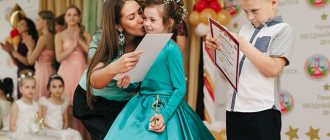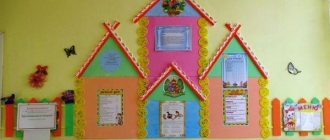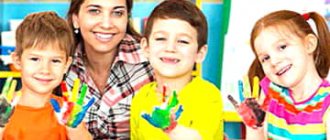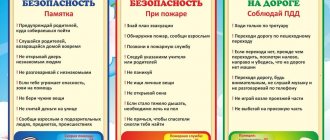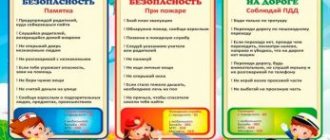Explanatory note
The Federal State Educational Standard for Preschool Education defines targets at the stage of completion of preschool education: “. the child masters the basic cultural methods of activity, shows initiative and independence in various types of activities - play, communication, cognitive and research activities, design, etc.; able to choose his own occupation and participants in joint activities.” (clause 4.6.)
Childhood is a time of active social “development” of a growing person and his assimilation of sociocultural achievements and values, a period of testing and self-determination in constantly expanding and increasingly complex contacts.
Preschool age is traditionally considered a period of intense socialization. Modern children live and develop in completely new sociocultural conditions. The extreme employment of parents, the generation gap, the isolation of the child in the family and other trends negatively affect the socialization of modern children. Effective socialization is one of the main conditions for a child’s life in society in general and the child’s personal readiness for school in particular.
Currently, great importance is given to volunteer work in social society. The institution of volunteering is widespread in many countries. Moreover, the work of volunteers is becoming more and more significant every year in Russian cities.
Volunteer (French volontaire - volunteer) is any individual, including foreign citizens and stateless persons, who contributes to the development of volunteerism by carrying out volunteer activities.
Volunteering is a wide range of activities, including traditional forms of mutual aid and self-help, formal service provision and other forms of civic participation, that are carried out voluntarily for the benefit of the general public without expectation of monetary reward.
Volunteering is based on voluntary work that does not require payment. Consequently, his motives are not in material rewards, but in satisfying social and spiritual needs. Volunteer activities are:
• planting flowers, bushes and trees;
• assistance to such social categories of citizens as: the elderly, street children, youth and students, the homeless, people with disabilities (disabled people), migrants, refugees, former prisoners and others;
• improvement and arrangement of courtyards, plots, city streets;
• helping animals;
• educational conversations;
• charity concerts and theatrical performances;
• environmental marches, garbage and pollution removal;
• promotion of healthy lifestyles; and etc.
A volunteer values such personality traits as hard work, kindness towards people around him, care and respect for nature, responsiveness and mercy, and a strong need for a healthy lifestyle.
The importance of labor as a factor in the development of a child’s personality is reflected in the history of Russian pedagogy: the works of V.A. Sukhomlinsky, P.P. Blonsky, A.S. Makarenko. Of no small importance are the studies of Ya.Z. Neverovich, T.A. Markova, who showed that the main motive that encourages children to work is their desire to help adults.
I.A. Knyazheva, in her dissertation “Pedagogical conditions for the education and development of mercy in children of senior preschool age,” considers mercy as the ability to take pity on the unfairly offended, the weak, the small, the sick, regardless of their external attractiveness; selflessly help those in need without reminders or prompts; give up something meaningful and interesting for the child.
The formation of goodwill in preschoolers was considered in the works of L.M. Shipitsyna, O.V. Zashirinskaya, E.I. Kulchitskaya. P.G. Samorukova studied the caring attitude of preschool children to nature.
The volunteer movement has a number of features, provided that it is organized in a preschool educational institution.
A pressing issue is the creation of a volunteer movement in kindergarten as a social institution that should prepare for life. And life is not only about academic knowledge. This is the development of certain life qualities:
- responsibility;
- mercy;
- independence;
- ability to communicate with different social groups of people;
- personal positivism.
Preschool age is characterized as a period of sensitivity for the development of all mental functions, as well as an important stage in the development and formation of the child’s personality. This served as an incentive to create a volunteer movement in kindergarten, because it is in preschool age that the above-mentioned personal qualities of children are formed.
The novelty lies in the fact that the organization of the volunteer movement is supposed to take place in a kindergarten.
Problem: Lack of experience among children of senior preschool age in demonstrating a social and moral position associated with various aspects of human social life in all their integrity and diversity.
Project goal: To introduce volunteer practice into the group’s activities aimed at developing the spiritual and moral personality of preschool children.
Organization of the volunteer movement “On the Road of Good” in kindergarten through the association of teachers, interested parents and children of senior preschool age and their participation in volunteer events.
Tasks:
- Expand the understanding of the volunteer movement among children 5-6 years old and parents of group students.
- To provide practical skills for participating in the volunteer movement to all participants in the educational process.
- Draw up an action plan and implement it during the 2022–2022 academic year.
Presentation “Working with parents in preschool educational institutions”
Working with parents group 3
One of the main tasks of the kindergarten is “interaction with the family to ensure the full development of the child”
We consider this interaction as a social partnership (equal participation in the upbringing of a kindergarten child and family).
Traditional forms:
Parent meetings (collective form)
Topics: “What a 5-6 year old child should know”,
“What will children in the senior group learn”, etc.
Conversations with parents (individual form): - “Children’s clothing according to the season” - “Child and parent” - “About the child’s behavior” - “The successes and interests of the child” - “About the child’s independence”, etc.
Testing, questioning of parents (individual form): - “About our kindergarten” - “Do you know your child?” - “What clubs does your child want to attend?”, etc.
Folders, stands, consultations for parents (visual information forms): - “Business card of our group”, “Daily routine”, “Menu” - “Age characteristics of older children” - “How to communicate correctly with children”, etc.
About health: — “All about baby food” — “Flu, ARVI. Prevention measures." — “On the benefits of vaccinations” — “The benefits of an oxygen cocktail” — “Anthropometric data of the children in the group”
About traffic rules: - “On the importance of teaching traffic rules to preschool children” - “Help children remember traffic rules”
About safety: - “So that there is no fire” - “So that there is no trouble” - “Where is the danger at home?”
-Poetic words about the seasons -Birthday children of our group -Rules of behavior in kindergarten
Non-traditional forms: Leisure forms: - Involving parents in preparing matinees (sewing costumes, learning poems, roles, purchasing equipment)
-Parental participation in various matinees
-Exhibitions of creative works of children, joint works of children and parents
Organizational forms: (Assistance to parents in creating an active developmental environment) -Purchase of toys: dolls, cars, construction sets, containers for toys, etc.
-Assistance in replenishing group equipment (bookshelves, shelves for toys)
-Help in replenishing board games
-Help in replenishing the book corner
-Enrichment of the drawing corner (purchase of pencils, coloring books, crayons, leaves)
-Purchasing napkins, toilet paper
-Help in insulating the group: replacing windows in the playroom and bedroom with plastic ones
-Assistance in repairs: groups, all chairs, booths, swings on the site
-Assistance in ordering, installing and assembling the “Ship” children’s wall
-Gift from parents - plasma TV
We are pleased with our close cooperation!
Project passport
1.Name of the project “On the Road of Goodness”
2.prepared the project: Svetlana Mikhailovna Dedkova, teacher of the II qualification category, Diana Saitovna Suleymanova, teacher of MADOU DS No. 29 “Yolochka”, Nizhnevartovsk.
3.Participants: group
4 Type of project: educational, creative, social informational, individual development.
5. Project participants: teacher, middle group students, parents of students
6. Educational area: social and communicative development, cognitive development, artistic and aesthetic development, speech development, physical development.
7. Project type: long-term
8.Material base: tools for cleaning the area, tools for decorating a volunteer’s corner, consumables for making toys and gifts, a camera.
9. Implementation period: from September 1, 2022 to May 25, 2022
Road map:
Implementation of step #1
| № | Event | Deadlines |
| 1 | Determining the goals, objectives and relevance of the project | September |
| 2 | Preparing a long-term project plan | September |
| 3 | Determining the implementation period and project participants | September |
Implementation of step No. 2
| № | Event | Deadlines |
| 1 | Preparation of changes to the organization and system of additional education in preschool educational institutions (planning additional activities, classes, excursions, etc.). | Constantly |
| 2 | Identification of project risks and ways to solve them | September |
Implementation of step No. 3
| № | Event | Deadlines |
| 1 | Preparation of the material base for the implementation of the project | October December |
| 2 | Carrying out activities with project participants | Constantly |
Magic Garden of Childhood
PRESENTATION (from Latin praesentatio - presentation, presentation) - an advertising event that includes a demonstration of a product, accompanied by films, videos, slides, as well as the distribution of information and promotional materials; it is a belief, it is a form of communication.
PRESENTATION OF A KINDERGARTEN is a high-tech way to convey information to the parent community; it is an excellent opportunity to show how a preschool institution lives and “breathes”; This is a presentation of the work of the kindergarten and the preschool education system as a whole.
The presentation of a kindergarten is bright, original, individual, because your presentation may contain information about a specific preschool educational institution, its resource availability, features of the functioning and organization of educational activities, as well as photographs, pictures, poems, graphs, the design of the kindergarten, i.e. everything that reflects the work of a preschool institution demonstrates the developmental environment in a kindergarten.
We bring to your attention the presentation of MDOAU “Kindergarten No. 14 “Dolphin” of a combined type” in Novotroitsk, Orenburg region
Accompanying words to the photo film (slides):
Municipal preschool educational institution “Kindergarten No. 14 “Dolphin” of a combined type” in Novotroitsk...
...invites you to a virtual tour of the kindergarten.
The kindergarten building is standard, two-story. The territory of the kindergarten is landscaped with plantings along the entire perimeter. In spring, children admire the blooming of lilacs and fruit trees. You can hide from the summer heat in the shade of birch, elm and rowan trees.
On the territory of the institution there are lawns, flower beds and flower beds, and a vegetable garden where children receive initial skills in labor education.
Currently there are 10 groups in the kindergarten:
2 early age groups (2-3 years), 2 younger (3-4 years),
average (4-5 years),
1 older (5-6 years old),
2 preparatory to school (6-7 years old), 2 speech therapy groups.
Optimal conditions have been created for the self-realization of the child’s personality. Modern furniture, modules, a sufficient number of toys, educational games make the stay of a preschooler not only comfortable, but also favorable for development.
The mission of our institution: Ensuring effective interaction of all participants in the pedagogical process - teachers, parents, children - in a single educational space for the comprehensive development of the personality of a preschooler.
In our kindergarten, much attention is paid to physical education and health; there is an after-care room.
Systematic work is being carried out to prevent infectious diseases: rooms in which children are located are treated with a quartz lamp
Our children take great pleasure in attending physical education classes, which in the warm season are held in the fresh air (on the sports ground), and in the cold season - in the gym, equipped with the necessary sports equipment and exercise equipment.
The harmony of the combination of various forms, colors of aids and equipment in the design of a physical education and play environment evokes positive emotions in preschoolers and forms the habit of regular physical education classes.
And with what pleasure kids splash in the pool! They learn not to be afraid of water, swim and strengthen their bodies.
Children's walks are compulsory and take place twice a day. Outdoor games, competitions, relay races: all these types of physical activity help improve the child’s health, develop him physically, increase immunity and resistance to infections.
Children's walking areas are decorated with various crafts and equipped with small playgrounds that promote meaningful walks.
Much attention in preschool educational institutions is given to the implementation of the regional (national) component, ensuring the natural entry of the child into the spiritual world and traditional life of the native people, into the culture of the nation as an integral part of universal culture. In the institution, teachers (with the active participation of parents) created the “My Orenburg Region” museum.
During the game, whychki get acquainted with the beautiful world of nature, full of secrets and wonders, using a variety of means from observations and experiments to riddles, theatrical performances, and viewing slides. The tasks are selected in such a way that they bring the joy of discovery, surprise from the natural beauty and harmony of nature, awaken in every child inquisitiveness and the desire to understand its secrets. Children begin to treat nature and the world around them sensitively and carefully.
Children discover the world of numbers and shapes. By analyzing small “mathematical problems” that a child encounters every day in his life, children learn to navigate the world around them, take initiative, express their own position, develop memory, logical thinking, patience and perseverance.
Speech therapy groups operate for children with severe speech impairments. Teachers-speech therapists carry out the development and correction of the entire language system: the formation of coherent speech, the assimilation of lexical and grammatical categories, the correction of pronunciation violations. The activities of speech therapists are not limited only to the group.
If at some point a child in the mass group experiences learning difficulties, the speech therapist will conduct several individual sessions with him. The main thing is to notice the problem in time, and... it’s gone! The child is confident, calm and content. He succeeded.
A child’s favorite activity in kindergarten is play. In the game he learns about the world, in the game his socialization takes place, relationships with other children are formed.
We try to make our children's games varied and interesting. There are many toys in the groups, selected according to the age of the child. In addition, we organize an interesting, meaningful life for children in kindergarten, which subsequently becomes a source of play ideas.
The teacher helps children organize the game, joins the game in order to enrich the plot or to involve an insecure child in the game.
In kindergarten, much attention is paid to the artistic education of each child. It is also carried out through familiarization with the fine arts and music.
Children practice modeling, drawing with paints and pencils in a specially equipped art studio.
How nice it is to see your work framed on the wall! Why not the first exhibition? Kindergarten students participate in creativity competitions at various levels.
Musical development is not only singing, developing an ear for music and a sense of rhythm, but also individual vocal training. The music director will teach the children all this. The music hall hosts children's parties, literary and musical matinees, evenings of leisure and entertainment.
The music room has a music center, as well as a full set of attributes for children, which are used in dances, exercises, and games. A rich selection of musical soundtracks allows you to diversify educational activities with children and expand the musical horizons of preschoolers.
Under the guidance of an experienced teacher and choreographer, children are immersed in the mysterious world of dance. Young talents learn to control their body, move gracefully in space, improvise, improve movement coordination, and master simple patterns of dance compositions.
In our kindergarten there are clubs for additional education for children.
Flat feet, poor posture, weak muscles - these problems are very common among preschoolers today. To correct such disorders, children are offered physical therapy classes (PT) with an experienced instructor.
Is chess a game? On the one hand, yes! And on the other hand, the development of memory, the ability to synthesize and analyze, and concentrate. Our students enjoy visiting the chess club and taking part in city competitions
And some students are immersed in the magical world of the theater, where the secrets of amazing art are revealed. In the circle, children study the alphabet of theater, develop artistic skills, learn stage speech, stage songs, poems, theatrical sketches, and participate in the production of fairy tales. They share their achievements in front of an audience of their peers and parents.
Working with parents
The work of our institution uses many different forms and methods of interaction with the families of pupils: lectures, consultations, practical exercises, and trainings. It has become traditional to hold Open Doors Day, Family Day, and Mother of the “Mom, Dad, I’m a Sports Family” competition. Promotion of pedagogical knowledge is carried out through parent corners. Parents actively work as part of the parent committee of the preschool educational institution.
Working with society
The institution actively works with the following organizations: children's clinic of secondary school No. 13, SUN, Schoolchildren's Home
By collaborating with secondary school No. 13, teachers carry out mutual visits to classes in the preparatory group for school and the first grade of the school, thereby having the opportunity to effectively prepare students for school. Joint exhibitions of children's works by schoolchildren and kindergarten students are also held; first-grade students are invited to holidays in kindergarten, thereby ensuring continuity in work.
The variety and quality of educational and health-preserving services provided by teachers, high performance results of the educational system of preschool educational institutions, quality of resource provision, compliance of educational services with social orders, indicators of pre-school preparation, coverage and transparency of the institution’s activities, awareness of parents and the public about the achievements of students and teachers contribute to the growth of the prestige of the institution, increasing its competitiveness in the market of educational services and attractiveness for parents, which leads to the preservation of the student population and the demand for preschool educational institutions among the population.
There are no similar entries.


